|
 Lepiota purpurata Lepiota purpurata
SynonymsLepiotula purpurata
Pluteus purpuratus
BiostatusPresent in region - Indigenous. Endemic
Images (click to enlarge)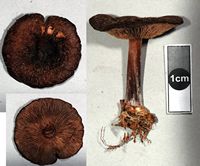
Owner: J.A. Cooper | 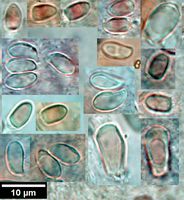
Caption: spores and basidia (melzers)
Owner: J.A. Cooper | 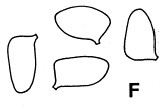
Caption: Fig. 15. F. Lepiota purpurata (STEVENSON) HORAK (type): spores | 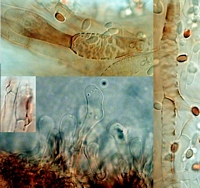
Caption: upper and right: cap hyphae. Left: clamps in cap hyphae. Bottom: cheilocystidia.
Owner: J.A. Cooper | 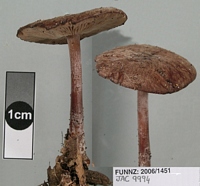
Caption: FUNNZ photo
Owner: J.A. Cooper | 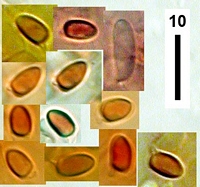
Caption: spores in Melzers.
Owner: J.A. Cooper | 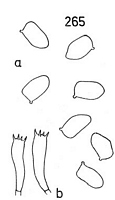
Caption: 265-Lepiotula purpurata: a. spores; b. basidia. | 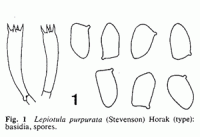 | 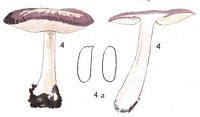
Caption: Plate 2: 4, Pluteus purpuratus, x 1 ;4a, spores, x 2000
Owner: PDD | 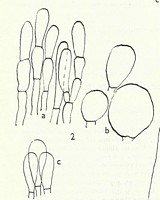
Caption: Fig. 1: 3, P. purpuratus, cells of cuticle, x 1000; 3b, ornamented hyphal ending, x 1000
Owner: PDD |
Article: Horak, E. (1980). On Australasian species of Lepiota S.F. Gray (Agaricales) with spurred spores. Sydowia 33: 111-144.
Habitat: Habitat. - On soil among litter in forests. - New Zealand.
Notes: Remarks. - The pink and free lamellae are probably the reason why STEVENSON
identified this species as a member of Pluteus FR. The spores are, however, distinctly
dextrinoid and slightly spurred. The basidia are 4-spored, 16-20x4-5 µm. The type
material is in rather bad condition and therefore the structure of the cuticle could not be
fully revived. By all means cellular elements are absent, and the cylindric hyphae
observed are encrusted with grey (KOH) pigment. Clamp connections not observed.
Article: Horak, E. (1980). Fungi Agaricini Novazelandiae. IX. Lepiotula (Maire) Locquin ex Horak. New Zealand Journal of Botany 18(2): 183-188 (http://www.rsnz.org/publish/abstracts.php).
Habitat: In forest litter. New Zealand.
Article: Horak, E. (1971). A contribution towards the revision of the Agaricales (Fungi) from New Zealand. New Zealand Journal of Botany 9(3): 403-462 (http://www.rsnz.org/publish/abstracts.php).
Description: Pluteus purpuratus Stevenson (26D) Fig. 22 = Lepiotula purpurata (Stevenson)
comb. nov. (Basionym: P. purpuratus Stevenson, Kew Bull. 16: 73, 1962)
Spores dextrinoid, indistinctly spurred, smooth, germ pore none, 5.5-6 X 3.5-4 µ.
Cheilo- and pleurocystidia not observed (type material in fragmentary condition).
The dimensions of the spores given by Stevenson are based on measurements of
alien Psathyrella spores. The free gills were obviously the reason for assigning the
fungus to Pluteus.
Article: Stevenson, G. (1962). The Agaricales of New Zealand: II. Kew Bulletin 16(1): 65–74.
Description: Pileus 4-5 cm. diam., nearly plane, purple-brown overlain with pink- fawn cottony fibrils, flesh purple-brown under the surface, otherwise whitish. Gills free, moderately crowded, dull-pink. Stipe 4 cm. x 5-10 mm., swollen at base, silky-fibrillose, whitish, hollow. Spores 3.5 x 8um, print pink. No cystidia. Cells of epicutis 10-20 x 10-12um mostly with dark contents; fibrils of cap consisting of thick-walled hyphae, 5um diam., with walls 1um thick, all with clamp connections, mostly dark-brown in colour, many covered thickly with tubercles about 1um long.
Habitat: in forest litter, Maungatua, 18.4.1953, Stevenson
|